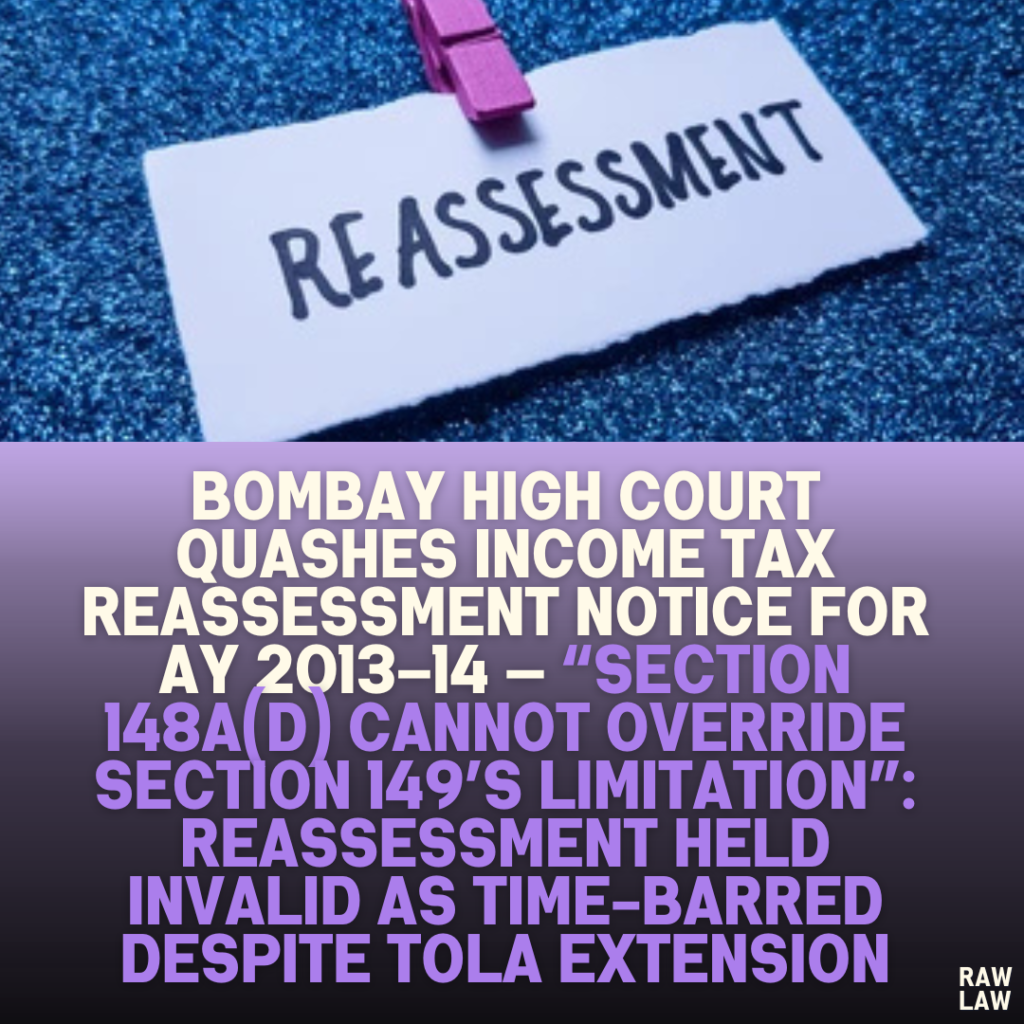Court’s Decision
The Bombay High Court at Goa quashed the reassessment notice dated 29.07.2022 issued under Section 148 of the Income Tax Act for AY 2013–14 as being time-barred under the first proviso to substituted Section 149(1) of the Act. The Court held that the proceedings initiated beyond the surviving period prescribed by law were invalid. Consequently, the impugned order under Section 148A(d) and the final assessment order dated 29.05.2023 were also quashed.
“A notice issued under Section 148 of the IT Act which is beyond the timeline stipulated under Section 149(1) is non-compliant and invalid.”
Facts
- The petitioner filed a return for AY 2013–14 on 31.03.2014 declaring income of ₹37,17,840.
- Scrutiny assessment under Section 143(3) was completed on 23.02.2016 with an assessed income of ₹60,60,370.
- On 29.06.2021, a reassessment notice under the unamended Section 148 was issued, which later came to be deemed under Section 148A(b) pursuant to the Supreme Court’s ruling in Ashish Agarwal.
- The Assessing Officer subsequently provided reasons for reopening and issued an order under Section 148A(d) on 29.07.2022, followed by a fresh notice under Section 148.
- Assessment was concluded with a final order dated 29.05.2023.
- Petitioner challenged the validity of the reassessment proceedings on grounds of limitation and non-compliance with statutory provisions.
Issues
- Whether the notice dated 29.07.2022 under Section 148 was barred by limitation under the substituted Section 149(1).
- Whether the reassessment proceedings were valid despite being initiated after the expiration of the permissible time limit under the amended regime.
Petitioner’s Arguments
- The reassessment notice was time-barred under the amended Section 149, read with the ruling in Ashish Agarwal and Rajeev Bansal.
- No approval was obtained under Section 151 post the order under Section 148A(d).
- No personal hearing was granted under Section 148A(d), despite specific requests.
- Documents/materials relied upon were not provided under Section 148A(b).
- The entire process violated the natural justice principle and was without jurisdiction.
Respondent’s Arguments
- The reassessment was valid under the extended timeline of TOLA, and the first notice dated 29.06.2021 was within the extended time limit of 30.06.2021.
- Section 148A(d) allows passing the order within one month from the end of the month in which the reply to Section 148A(b) notice is received.
- All procedural requirements, including prior approvals, were fulfilled.
- Relied on judgments including Ashish Agarwal, Rajeev Bansal, Sanman Impex, and New India Assurance to assert the validity of the reassessment.
Analysis of the Law
- The Court interpreted Ashish Agarwal and Rajeev Bansal to mean that although earlier notices under Section 148 were preserved as deemed notices under the new regime, the entire reassessment procedure had to conclude within the “surviving period” of limitation.
- The period of limitation expired on 23.07.2022 after excluding relevant periods as per judicial interpretation.
- Thus, both the order under Section 148A(d) and the subsequent notice under Section 148 dated 29.07.2022 were issued beyond the surviving period.
Precedent Analysis
- The Court relied extensively on Union of India v. Ashish Agarwal (2022) and Rajeev Bansal v. Union of India (2024), which clarified how limitation should be computed post-substitution of Sections 147 to 151 and application of TOLA.
- The Court also referenced the Delhi High Court ruling in Ram Balram Buildhome v. ITO, where reassessment notices under similar facts were quashed as time-barred.
- It dismissed reliance on contrary judgments not consistent with the Supreme Court’s rulings in Ashish Agarwal and Rajeev Bansal.
Court’s Reasoning
- The statutory scheme under the substituted Section 149 mandates the completion of reassessment procedures within the remaining or “surviving” period of limitation.
- The order under Section 148A(d) and notice under Section 148 issued on 29.07.2022 exceeded the allowable period, which ended on 23.07.2022.
- The Revenue’s reliance on Section 148A(d) timeline could not override or extend the time limit under Section 149.
Conclusion
The reassessment notice dated 29.07.2022 and order under Section 148A(d) were held to be time-barred and thus quashed. Consequently, the final assessment order dated 29.05.2023 was also set aside.
“Section 148A(d) does not govern the computation of time as contemplated in terms of Section 149… To suggest otherwise is misconceived and lacks legal sanctity.”
Implications
This judgment reinforces that reassessment proceedings must strictly adhere to the statutory time limits under the amended Income Tax Act and clarified by the Supreme Court. It emphasizes that procedural streamlining provisions under Section 148A cannot be used to bypass substantive limitations imposed under Section 149.
It provides clarity and certainty for assessees affected by reassessment notices issued during the transition to the new regime.




Pingback: Supreme Court Upholds Vicarious Liability in NI Act Proceedings - Respondent No. 2, Who Actively Negotiated the Facility, Executed the Loan and Security Documents, and Provided Personal Guarantees, Held Liable - “Repetition of the Exact Words of the Sec